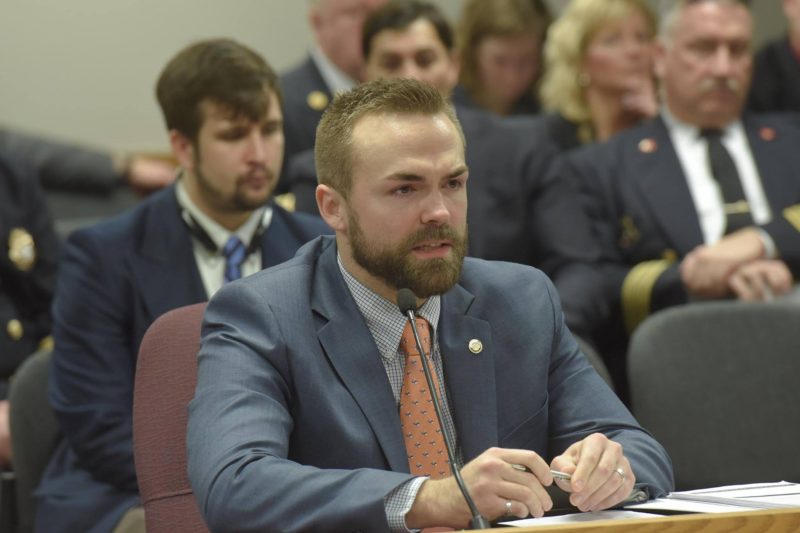JEFFERSON CITY, Mo. – In the state of Missouri, a 17-year-old cannot vote, join the army, buy cigarettes, gamble, or even serve on a jury, but they can be tried as adults in a court of law. Right now, Missouri is one of only seven states that automatically prosecutes 17-year-olds as adults. In fact, any juvenile between the ages of 12 and 17 who has allegedly committed a felony can be tried as an adult under current statute.
HB 274, sponsored by Rep. Nick Schroer, R-O’Fallon, and its Senate counterpart, SB 40 filed by Sen. Wayne Wallingford, R-Cape Girardeau, look to change that.
The proposed legislation would require that anyone younger than 18 years of age be prosecuted in the juvenile courts unless they have been certified as an adult, and even then, it only if they are 16 or 17 years of age.
The Raise the Age coalition says that 93 percent of 17-year-olds arrested in Missouri in 2015 were accused of offenses that involve neither violence nor weapons. Under the proposed legislation, they would be dealt with in the juvenile justice system.
Schroer, who has defended juveniles in court, says the bill is simply a common-sense proposal that can change the lives of Missouri’s youth while affecting a number of other areas in a positive way.
He says that, in other states, the bill has been proven to reduce crime and keep convicted teens from returning to corrections on another offense. The Centers for Disease Control reports that including 17-year-olds in the juvenile system reduces repeat offenses by 34 percent. Schroer’s goal is to end the vicious circle that keeps facilitating criminals to return.
Schroer also says the bill is about families. If a 17-year-old is arrested, the parents are not required to be notified. By trying the case in the juvenile court, parents and legal guardians still play a role, and the child is not left to attempt to make the decisions that could affect them for the rest of their lives on their own.
More importantly, Schroer says it’s safer for the kids. According to Raise the Age’s website, “youth in adult prisons face high risks of violence and sexual assault, and they often spend up to 23 hours every day in solitary confinement, leading to physical and psychological harm.”
But one facet of the bill that Schroer says might be the largest benefit to the state is that by placing the convicted teens in the juvenile system, the issues of finding employment, getting enrolled for education, or even renting a home are made easier on the individuals because the charge is not reflected on their criminal record.
“If you complete the course of that case and graduate out of the juvenile justice system, you don’t have that felony hanging over your head,” he said. “And they’re setting you up and teaching you job skills.”
Schroer says that, in a time when the state wants to bring in more jobs, this would enable more people to be included in the available workforce.
The only issue Schroer foresees is the potential cost.
“The only opposition to this bill I have heard so far question the issue of money and funding, and where it will come from,” Schroer said. “My response is that this law is not creating a new criminal or a new class of offender, but putting them on a different avenue. Housing these teens as adults may be cheaper, but it could set that child on a path that would continue to bring them into the criminal justice system. So, over the long haul, it’s going to be more expensive for the state of Missouri to put them on that path.”
Schroer also points out that some of lesser criminal acts could result in the teenager being put on house arrest, putting them on their own dime.
And Schroer’s bill tries to take the costs into account as well. The only real difference between Schroer’s bill and Wallingford’s SB40 is the delayed effective date in HB 274. Schroer proposes that the legislation be implemented on January 1, 2020, in order to build up to it, rather than forcing it into effect immediately and having to allocate funds that the state might not have right now.
While the bill currently awaits a hearing in the House Judiciary Committee, Schroer says that the legislation already has support from members on both sides of the aisle in the House.
“This is an issue that is an extremely bipartisan issue,” he said. “I’m very excited to see where this is going to go next. To me, it’s a common-sense measure that needs to pick up some steam, because it can help our state’s youth and address issues in a state that is in fiscal ruin right now.”
Benjamin Peters was a reporter for The Missouri Times and Missouri Times Magazine and also produced the #MoLeg Podcast. He joined The Missouri Times in 2016 after working as a sports editor and TV news producer in mid-Missouri. Benjamin is a graduate of Missouri State University in Springfield.















